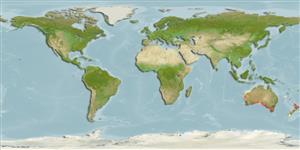Teleostei (teleosts) >
Acropomatiformes (Oceanic basses) >
Dinolestidae (Long-finned pike)
Etymology: Dinolestes: Greek, deino = terrible + Greek, lestes = thief (Ref. 45335).
Environment: milieu / climate zone / depth range / distribution range
Ecology
Marine; pelagic-neritic; depth range 5 - 65 m (Ref. 9563). Temperate
Eastern Indian Ocean: endemic to southern Australia (including New South Wales).
Size / Weight / Age
Maturity: Lm ? range ? - ? cm
Max length : 84.0 cm TL male/unsexed; (Ref. 9563)
A schooling species found in bays over rocky reefs (Ref. 9563).
Life cycle and mating behavior
Maturities | Reproduction | Spawnings | Egg(s) | Fecundities | Larvae
Nelson, J.S., 1984. Fishes of the world. 2nd edition. John Wiley & Sons, Inc., New York. 523 p. (Ref. 245)
IUCN Red List Status (Ref. 130435)
Threat to humans
Harmless
Human uses
Tools
Special reports
Download XML
Internet sources
Estimates based on models
Preferred temperature (Ref.
123201): 15.1 - 22.7, mean 17.8 °C (based on 174 cells).
Phylogenetic diversity index (Ref.
82804): PD
50 = 1.5000 [Uniqueness, from 0.5 = low to 2.0 = high].
Bayesian length-weight: a=0.00389 (0.00180 - 0.00842), b=3.12 (2.94 - 3.30), in cm total length, based on all LWR estimates for this body shape (Ref.
93245).
Trophic level (Ref.
69278): 3.7 ±0.5 se; based on size and trophs of closest relatives
Fishing Vulnerability (Ref.
59153): Moderate to high vulnerability (54 of 100).
Nutrients (Ref.
124155): Calcium = 37.9 [18.6, 65.7] mg/100g; Iron = 0.494 [0.276, 0.826] mg/100g; Protein = 18.4 [17.3, 19.4] %; Omega3 = 0.34 [0.18, 0.66] g/100g; Selenium = 15.3 [7.2, 31.6] μg/100g; VitaminA = 10.4 [2.9, 39.4] μg/100g; Zinc = 0.575 [0.400, 0.820] mg/100g (wet weight);
